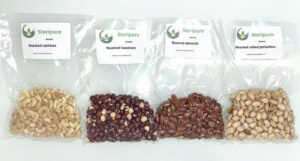Roasting does not replace pasteurization
Microbiological contamination, particularly in raw products such as nuts, is a major risk.
Roasting alone is insufficient for effective pasteurisation. Hot air only achieves a 2-log reduction, which is not enough to control the risk of salmonella, which requires a 5-log reduction.
The NAPASOL system uses saturated steam. This contains 5 times more energy and enthalpy than water or dry air at the same temperature.
For example, boiling water at 100°C contains no more enthalpy than hot air at 100°C, i.e. 417 to 421 k joules. However, if you evaporate water into steam, still at 100°C, it contains 2257 joules – 5 times more energy than it gives off when it condenses on the surface of the product.
In other words, at 121°C it takes 15 minutes to fully sterilise a product with saturated steam, whereas at the same dry air temperature it takes 600 minutes.
Therefore, the use of saturated steam makes it easy to achieve the reduction target at low temperatures, usually as low as 85°C.
Pasteurisation followed by roasting.
Since 2023, Napasol has included a roasting stage in its pasteurisation lines.
Evidently, pasteurisation controls the microbiological risk. Torrefaction, which follows pasteurisation, allows the desired colour and delicate aromas to develop.
With this roasting option, the container of pasteurised nuts enters the roasting cell while still hot. Hot air of between 120° and 130°C is then passed through the product. Combining this operation with pasteurisation results in significant energy savings.
The container then passes through the cooling cell. The products emerge pasteurised, roasted and ready for packaging.
Roasting can be adjusted to suit industrial applications such as chocolate, nutrition bars, spreads, etc.
 Let us know which roasted products (almonds, cashews, pistachios in shell, macadamias) you are interested in and if you would like to receive samples.
Let us know which roasted products (almonds, cashews, pistachios in shell, macadamias) you are interested in and if you would like to receive samples.

